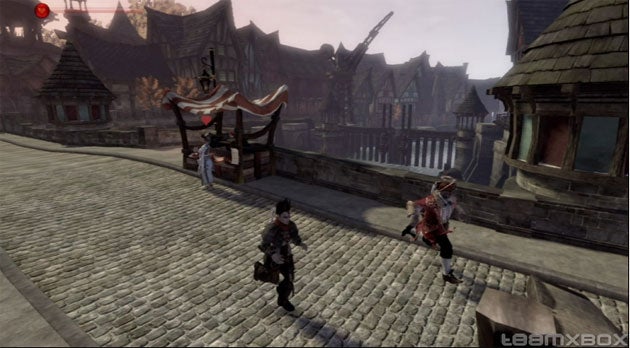Fable 2: Adventures in narrative

Mention casual gaming to Peter Molyneux, founder of game developers Lionhead, and the expression that passes across his face could barely look less casual. "There's a lot more people jumping on boards and waving sticks and doing casual games, and an awful lot of publishers now are literally going out and trying to create games for those people", he responds. You can't help but get the impression that this might well vex him a little. "Only the games that are excruciatingly casual", he adds, "are making casual gamers feel good".
Peter Molyneux's work over the last 25 years has been revolutionary and his most recognisable efforts, games such as Theme Park, Dungeon Keeper and Populous, all helped in highly individual ways to redefine the field in which he has worked. His latest release, Fable 2 (released last Monday), a "sandbox" fantasy game which combines the immersion of role-playing games with the thrills of the adventure genre promises to do the same. Molyneux's ambitions are not modest; his goal is to approach games development from a totally different perspective to that of many of his peers: "The psychology of making a video game was in the past based around, 'What's gonna make you sweat, what's gonna keep you on the edge of your seat'. That's a fundamental problem for me as a designer, because if a game succeeds at making you sweat you'll be sweating all the time. Rather than saying 'what makes you sweat', we've tried to replace that line with 'how does it make you feel?'"
Effecting and practicing this change has been one of Molyneux's key innovations in the field, and it's largely been achieved by subverting the traditional narrative to which video game fans have become accustomed. For the most part, the history of video games plots has been one of men beating other men and rescuing women, from Mario's pursuit of Princess Peach to the male protagonists of the modern era (see Solid Snake of Metal Gear Solid and, worse, Grand Theft Auto's Niko Belic). The wish fulfilment of young heterosexual male gamers has been central to gaming since it inception, and, while the typical gamer has changed in recent years with both genders and older (and younger) people now taking part, the narrative ideas presented in the vast majority of games have failed to react to this change anywhere near quickly enough.
In Dungeon Keeper, a game Molyneux developed at former company Bullfrog in 1997, the game turned the tables on this legacy by allowing the player to take on the heroes by becoming one of the bad guys. In Fable II the subversion is more subtle. While it is still possible to play as a male hero adventuring and pursue women, when starting the game players must choose the gender of their avatar. Later on, when it becomes possible to form relationships with in-game characters, it's possible to have homosexual marriages in the same way it's possible to have heterosexual ones.
It isn't that Lionhead has abandoned the precedents of their gaming forebears; it's that they've made a conscious effort to expand upon them: "We wanted to create a story that you could never forget," Peter tells me. "That meant making a game which can be played by someone who hasn't picked up computer games before and making sure they don't feel stupid. Computer games have this unbelievable ability to say to you, 'be who you want.'"
He concedes that when making the first Fable game, his team didn't focus enough on storytelling: "We were in a place where we were like 12-year-old boys talking about our favourite adventure. We didn't know how to write the story, we didn't know how to write the characters, we didn't know about pacing or about the hero's journey", he tells me. By way of illustration, he adds "in the original, there was one character who was literally a checkout girl in our local Tesco".
In contrast, the sequel features the vocal talents of such accomplished figures as Zoe Wanamaker, Stephen Fry, Bill Nighy and Helena Bonham Character. Scriptwriters were drafted in from such diverse televisual offerings as Holby City and Desperate Housewives, and the team had crucial sections of the game directed and acted out on a sound stage normally used for professional filming in order to give crucial parts of the plot dramaturgical authenticity. In addition, the amount of dialogue has multiplied by ten since the original, to a total of 200,000 lines, in order to create the sense of a reactive, living world; "To give you that feeling of uniqueness when you do that something that's good or bad or stupid or clever, the world reacts to you and that happens mainly through the dialogue."
Reaction to the game has been overwhelmingly positive, but it sounds like one reviewer's opinion in particular has affected its creator. "He came up to me and said 'I cant go any further in the game'", Molyneux recalls. "My heart sunk and I thought that there must have been a bug in there that prevented him from progressing. I asked him if that was it, and he said 'No, I'm terrified that something terrible is going to happen if I go any further'. He was thinking about his family in the game, and he worried that he was going to lose something he cared about. That's the trick: to get you to care about something. That", he concludes, "is the key".
Join our commenting forum
Join thought-provoking conversations, follow other Independent readers and see their replies
Comments
Bookmark popover
Removed from bookmarks